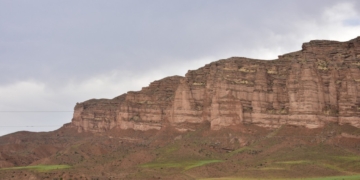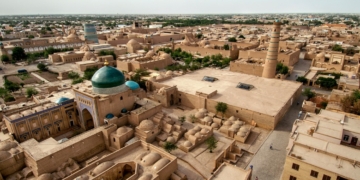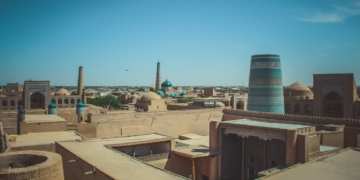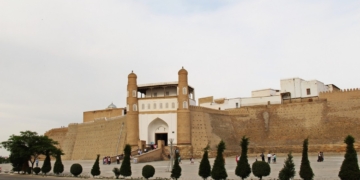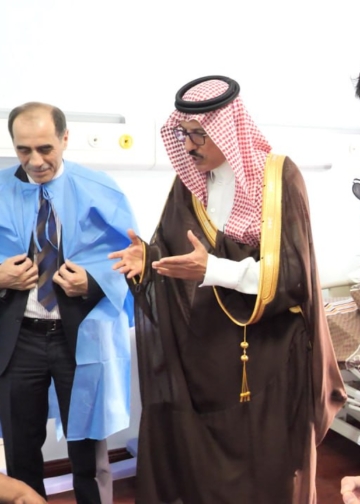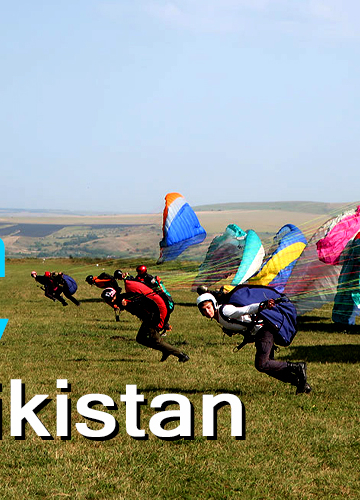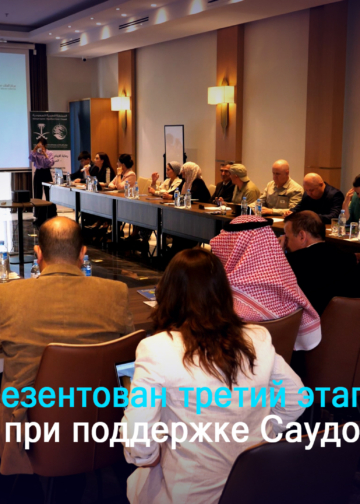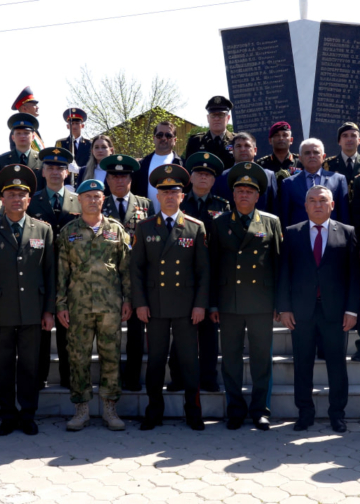id: 116205
date: 7/23/2007 5:45
refid: 07DUSHANBE1088
origin: Embassy Dushanbe
classification: CONFIDENTIAL
destination: 07DUSHANBE1078
header:
VZCZCXRO9419
RR RUEHDBU
DE RUEHDBU #1088/01 2040545
ZNY CCCCC ZZH
R 230545Z JUL 07
FM AMEMBASSY DUSHANBE
TO RUEHC/SECSTATE WASHDC 0683
INFO RUCNCIS/CIS COLLECTIVE
RUEAIIA/CIA WASHDC
RUCNDT/USMISSION USUN NEW YORK 1481
RUEHVEN/USMISSION USOSCE 2011
RUEHBUL/AMEMBASSY KABUL 2194
RUEHNE/AMEMBASSY NEW DELHI 2163
RUEHIL/AMEMBASSY ISLAMABAD 2205
RUEHDBU/AMEMBASSY DUSHANBE 2497
—————— header ends —————-
C O N F I D E N T I A L SECTION 01 OF 02 DUSHANBE 001088
SIPDIS
SIPDIS
STATE FOR SCA/CEN, DRL
E.O. 12958: DECL: 7/23/2017
TAGS: PGOV, PHUM, KIRF, TI
SUBJECT: JEHOVAH’S WITNESSES CONTINUE TO DEFY SOVIET-ERA RELIGIOUS
SUSCPICION ST
REF: A) DUSHANBE 1077; B) DUSHANBE 1078
CLASSIFIED BY: Tracey Ann Jacobson, Ambassador, U.S. Embassy
Dushanbe, STATE.
REASON: 1.4 (b), (d)
1. (SBU) SUMMARY: Following a scheduled court hearing, Greg
Olds, Jehovah’s Witnesses Associate General Counsel and Vladimir
Voyevodin, a Jehovah’s Witnesses lawyer from Almaty, Kazakhstan
met with PolOff July 20 to update the Embassy on the legal case
pertaining to the group’s confiscated religious literature
(REFTEL A) and two American citizens forced by the State
Committee on National Security to flee Tajikistan. A Dushanbe
City Court judge postponed the appeals hearings until July 24.
Meanwhile, according to Olds, both American citizens are safe,
but their whereabouts remain a mystery.
END SUMMARY.
RELIGIOUS LITERATURE REMAINS IN CUSTOMS LIMBO
2. (SBU) In an effort to release its confiscated
literature,
the local chapter of Jehovah’s Witnesses had filed two suits in
two different Tajik district courts.
One suit filed in the Sino
District Court is against the customs authority for confiscating
Jehovah’s Witnesses’ imported literature and the second is filed
in the Shomansur District Court against the Ministry of Culture
challenging its unfavorable «expert» analysis of the
literature.
Because the customs authority and
Ministry of Culture are
located in two different jurisdictions, two different cases had
to be filed. At the initial
hearings, judges had dismissed both
cases because of technicalities.
On July 20 a three judge panel
was supposed to have heard the appeal from the Jehovah’s
Witnesses on the grounds that the judge in the Shomansur
District Court case violated the law by dismissing the case. A
judge informed Olds July 20 that both appeals would take place
July 24.
3. (SBU) Greg Olds informed PolOff he is leaving
Tajikistan
July 25 for another destination in Central Asia. However,
Jehovah’s Witnesses local lawyer Jamshed Hojibaev will represent
the organization here in Tajikistan.
Should the organization
decide to send another lawyer from its world headquarters in New
York, PolOff reminded Olds of the new visa application
procedures which would require a Jehovah’s Witnesses lawyer from
the United States to apply for a visa at the Tajik Embassy in
Washington prior to arriving in country.
4. (C) Despite the fact that the
State Committee on National
Security has confiscated the Jehovah’s Witnesses’ imported
literature, the group continues to import materials via
airplane. The confiscated
shipments had come by rail. The air
shipments have continued to arrive from March through June even
after the other shipments were detained.
Jehovah’s Witnesses
showed PolOff all documentation and stamped approvals from
airport customs. The imports are
for the same Jehovah’s
Witnesses organization registered in Tajikistan and the
procedure for obtaining customs clearance was the same as the
rail shipments. The amount of
materials arriving by air is
significantly less. (Comment: The group’s ability to import
literature by plane indicates that either the airport customs
authorities, rail customs and the State Committee on National
Security are not talking to each other, or the government’s main
concern is not the content but the quantity of literature the
Jehovah’s Witnesses are importing.)
5. (SBU) On July 20, Olds met
with Ziyoyev the head of the
Department of Religious Affairs at the Ministry of Culture.
(Note: Muradullo Davlatov is the Deputy Minister of Culture who
really oversees the Department and was formerly the chairman of
the State Committee on Religious Affairs.) Olds viewed the
meeting as positive and said that Ziyoyev promised the Jehovah’s
Witnesses an explanation of written inspection requirements for
importing literature. Olds
explained to PolOff that that
Jehovah’s Witnesses can agree to import a reduced amount of
literature but was adamant that the organization would continue
importing literature because the group views use of its
literature as an act of worship.
AMCIT LOCATION REMAINS UNCLEAR
6. (C) Olds continued to say
James and Jane Hwang have left
Tajikistan, but would not reveal where they are currently
located. [Background: State
Committee on National Security
officials stopped James Hwang in Dushanbe July 13 and ordered
DUSHANBE 00001088 002 OF 002
him and his wife leave Tajikistan the very next day (RETEL B).]
Before leaving the meeting July 20 Olds remarked, «Theoretically
you know, the Hwangs could still return because they do have a
valid visa.» PolOff
discouraged the Hwangs return under current
circumstances, informed Olds that the Tajik government is most
likely keeping a keen eye out for them, and explained that if
they do return they could face serious consequences. Olds
agreed and dismissed his earlier comment, saying that he doesn’t
really think they would come back.
PolOff reminded Olds that
the Embassy would like to assist American citizens and advocate
for religious freedom and tolerance within Tajikistan, but needs
to have full and accurate information from the Jehovah’s
Witnesses.
7. (SBU) When Olds met with
EmbOffs July 16 he had mentioned
that one of the problems the security officials had with Hwang
was that he was influencing minors at a local school. Olds at
the time said that Hwang had never set foot in a school to
proselytize. What he and Hwang
neglected to tell EmbOffs
earlier was that when Hwang was questioned by the Ministry of
Culture on May 11, it was not simply about his registration. As
it turns out, on May 11 Hwang was not only handing out pamphlets
on the street with one other Jehovah’s Witness as stated, he was
handing out pamphlets with minors.
The Ministry of Culture sent
the Jehovah’s Witnesses a letter saying that Hwang violated
Articles 3 and 21 of the current law on religion prohibiting
engaging minors in religious activity without parental consent.
Jehovah’s Witnesses say they have documents signed by the
parents granting permission for the minors. The parents are
Jehovah’s Witnesses themselves.
However they are «divided
families.» Apparently in
both sets of parents, at least one
parent did not give consent, which gives room for the government
to accuse Hwang of illegally influencing minors.
8. (C) COMMENT: Olds has not been forthcoming and direct with
information. He refuses to answer
questions relating to the
whereabouts of the Hwangs or what the Jehovah’s Witnesses’
future plans are. Post cannot
confirm that the Hwangs have
indeed left Tajikistan; and Ministry of Foreign Affairs
officials told EmbOffs on July 19 that security and immigration
officials had checked all exit points and had found no record of
the Hwangs’ departure. Post is
concerned the Hwangs may return
to Tajikistan, based on Olds’ vague comments about their still
valid visa and that they have been assigned to Tajikistan for
life. If Hwang returns to
Tajikistan or if the State Committee
for National Security discovers that Jehovah’s Witnesses
continue to import literature despite the current confiscation,
it may view those acts as blatant defiance of governmental
authority. This could further
erode the operating climate for
nongovernmental and religious organizations, especially those
with American staff and members.
END COMMENT.
JACOBSON
=======================CABLE ENDS============================
id: 116416
date: 7/24/2007 12:23
refid: 07DUSHANBE1090
origin: Embassy Dushanbe
classification: CONFIDENTIAL
destination: 07DUSHANBE1078
header:
VZCZCXRO0815
RR RUEHDBU
DE RUEHDBU #1090/01 2051223
ZNY CCCCC ZZH
R 241223Z JUL 07
FM AMEMBASSY DUSHANBE
TO RUEHC/SECSTATE WASHDC 0688
INFO RUCNCIS/CIS COLLECTIVE
RUEAIIA/CIA WASHDC
RUCNDT/USMISSION USUN NEW YORK 1483
RUEHVEN/USMISSION USOSCE 2013
RUEHBUL/AMEMBASSY KABUL 2196
RUEHNE/AMEMBASSY NEW DELHI 2165
RUEHIL/AMEMBASSY ISLAMABAD 2207
RUEHDBU/AMEMBASSY DUSHANBE 2502
—————— header ends —————-
C O N F I D E N T I A L SECTION 01 OF 02 DUSHANBE 001090
SIPDIS
SIPDIS
STATE FOR SCA/CEN, DRL
E.O. 12958: DECL: 7/23/2017
TAGS: PGOV, PHUM, KIRF, TI
SUBJECT: JEHOVAH’S WITNESSES CONTINUE TO DEFY SOVIET-ERA RELIGIOUS
SUSCPICION
REF: A) DUSHANBE 1077; B) DUSHANBE 1078
CLASSIFIED BY: Tracey Ann Jacobson, Ambassador, U.S. Embassy
Dushanbe, STATE.
REASON: 1.4 (b), (d)
Corrected Copy of Dushanbe 1088.
New Subject line.
1. (SBU) SUMMARY:
Following a scheduled court hearing, Greg
Olds, Jehovah’s Witnesses Associate General Counsel and Vladimir
Voyevodin, a Jehovah’s Witnesses lawyer from Almaty, Kazakhstan
met with PolOff July 20 to update the Embassy on the legal case
pertaining to the group’s confiscated religious literature
(REFTEL A) and two American citizens forced by the State
Committee on National Security to flee Tajikistan. A Dushanbe
City Court judge postponed the appeals hearings until July 24.
Meanwhile, according to Olds, both American citizens are safe,
but their whereabouts remain a mystery.
END SUMMARY.
RELIGIOUS LITERATURE REMAINS IN CUSTOMS LIMBO
2. (SBU) In an effort to release its confiscated
literature,
the local chapter of Jehovah’s Witnesses had filed two suits in
two different Tajik district courts.
One suit filed in the Sino
District Court is against the customs authority for confiscating
Jehovah’s Witnesses’ imported literature and the second is filed
in the Shomansur District Court against the Ministry of Culture
challenging its unfavorable «expert» analysis of the
literature.
Because the customs authority and
Ministry of Culture are
located in two different jurisdictions, two different cases had
to be filed. At the initial
hearings, judges had dismissed both
cases because of technicalities.
On July 20 a three judge panel
was supposed to have heard the appeal from the Jehovah’s
Witnesses on the grounds that the judge in the Shomansur
District Court case violated the law by dismissing the case. A
judge informed Olds July 20 that both appeals would take place
July 24.
3. (SBU) Greg Olds informed PolOff he is leaving
Tajikistan
July 25 for another destination in Central Asia. However,
Jehovah’s Witnesses local lawyer Jamshed Hojibaev will represent
the organization here in Tajikistan.
Should the organization
decide to send another lawyer from its world headquarters in New
York, PolOff reminded Olds of the new visa application
procedures which would require a Jehovah’s Witnesses lawyer from
the United States to apply for a visa at the Tajik Embassy in
Washington prior to arriving in country.
4. (C) Despite the fact that the
State Committee on National
Security has confiscated the Jehovah’s Witnesses’ imported
literature, the group continues to import materials via
airplane. The confiscated
shipments had come by rail. The air
shipments have continued to arrive from March through June even
after the other shipments were detained.
Jehovah’s Witnesses
showed PolOff all documentation and stamped approvals from
airport customs. The imports are
for the same Jehovah’s
Witnesses organization registered in Tajikistan and the
procedure for obtaining customs clearance was the same as the
rail shipments. The amount of
materials arriving by air is
significantly less. (Comment: The group’s ability to import
literature by plane indicates that either the airport customs
authorities, rail customs and the State Committee on National
Security are not talking to each other, or the government’s main
concern is not the content but the quantity of literature the
Jehovah’s Witnesses are importing.)
5. (SBU) On July 20, Olds met
with Ziyoyev the head of the
Department of Religious Affairs at the Ministry of Culture.
(Note: Muradullo Davlatov is the Deputy Minister of Culture who
really oversees the Department and was formerly the chairman of
the State Committee on Religious Affairs.) Olds viewed the
meeting as positive and said that Ziyoyev promised the Jehovah’s
Witnesses an explanation of written inspection requirements for
importing literature. Olds explained
to PolOff that that
Jehovah’s Witnesses can agree to import a reduced amount of
literature but was adamant that the organization would continue
importing literature because the group views use of its
literature as an act of worship.
AMCIT LOCATION REMAINS UNCLEAR
6. (C) Olds continued to say
James and Jane Hwang have left
Tajikistan, but would not reveal where they are currently
DUSHANBE 00001090 002 OF 002
located. [Background: State
Committee on National Security
officials stopped James Hwang in Dushanbe July 13 and ordered
him and his wife leave Tajikistan the very next day (RETEL B).]
Before leaving the meeting July 20 Olds remarked, «Theoretically
you know, the Hwangs could still return because they do have a
valid visa.» PolOff
discouraged the Hwangs return under current
circumstances, informed Olds that the Tajik government is most
likely keeping a keen eye out for them, and explained that if
they do return they could face serious consequences. Olds
agreed and dismissed his earlier comment, saying that he doesn’t
really think they would come back.
PolOff reminded Olds that
the Embassy would like to assist American citizens and advocate
for religious freedom and tolerance within Tajikistan, but needs
to have full and accurate information from the Jehovah’s
Witnesses.
7. (SBU) When Olds met with
EmbOffs July 16 he had mentioned
that one of the problems the security officials had with Hwang
was that he was influencing minors at a local school. Olds at
the time said that Hwang had never set foot in a school to
proselytize. What he and Hwang
neglected to tell EmbOffs
earlier was that when Hwang was questioned by the Ministry of
Culture on May 11, it was not simply about his registration. As
it turns out, on May 11 Hwang was not only handing out pamphlets
on the street with one other Jehovah’s Witness as stated, he was
handing out pamphlets with minors.
The Ministry of Culture sent
the Jehovah’s Witnesses a letter saying that Hwang violated
Articles 3 and 21 of the current law on religion prohibiting
engaging minors in religious activity without parental consent.
Jehovah’s Witnesses say they have documents signed by the
parents granting permission for the minors. The parents are
Jehovah’s Witnesses themselves.
However they are «divided
families.» Apparently in
both sets of parents, at least one
parent did not give consent, which gives room for the government
to accuse Hwang of illegally influencing minors.
8. (C) COMMENT: Olds has not been forthcoming and direct with
information. He refuses to answer
questions relating to the
whereabouts of the Hwangs or what the Jehovah’s Witnesses’
future plans are. Post cannot
confirm that the Hwangs have
indeed left Tajikistan; and Ministry of Foreign Affairs
officials told EmbOffs on July 19 that security and immigration
officials had checked all exit points and had found no record of
the Hwangs’ departure. Post is
concerned the Hwangs may return
to Tajikistan, based on Olds’ vague comments about their still
valid visa and that they have been assigned to Tajikistan for
life. If Hwang returns to
Tajikistan or if the State Committee
for National Security discovers that Jehovah’s Witnesses
continue to import literature despite the current confiscation,
it may view those acts as blatant defiance of governmental
authority. This could further
erode the operating climate for
nongovernmental and religious organizations, especially those
with American staff and members.
END COMMENT.
JACOBSON
=======================CABLE ENDS============================
id: 116421
date: 7/24/2007 13:01
refid: 07DUSHANBE1091
origin: Embassy Dushanbe
classification: UNCLASSIFIED
destination:
header:
VZCZCXRO0866
PP RUEHLN RUEHVK RUEHYG
DE RUEHDBU #1091 2051301
ZNR UUUUU ZZH
P R 241301Z JUL 07
FM AMEMBASSY DUSHANBE
TO RUEHC/SECSTATE WASHDC PRIORITY 0690
INFO RUCNCIS/CIS COLLECTIVE
RUEHBUL/AMEMBASSY KABUL 2198
RUEHNE/AMEMBASSY NEW DELHI 2167
RUEHIL/AMEMBASSY ISLAMABAD 2209
RUEHPW/AMCONSUL PESHAWAR 0043
RHEHAAA/NATIONAL SECURITY COUNCIL WASHINGTON DC
RUCNDT/USMISSION USUN NEW YORK 1485
RHEFDIA/DIA WASHINGTON DC
RUEAIIA/CIA WASHINGTON DC
RUEHDBU/AMEMBASSY DUSHANBE 2504
—————— header ends —————-
UNCLAS DUSHANBE 001091
SIPDIS
SIPDIS
E.O. 12958: N/A
TAGS: PGOV, ECON, EAID, EAGR, TI
SUBJECT: TAJIKISTAN’S WATER USERS ASSOCIATIONS: SUSTAINABLE
DEVELOPMENT IN ACTION
1. Summary: Winrock
International’s water users’ associations
provide an example of the kind of «bottom-up» assistance that
delivers substantial and sustainable benefits to Tajikistan’s
poorest. During a July 20 site
visit in Rudaki District, 30
miles outside Dushanbe, PolOff saw first hand how U.S. funding
in this area can help farmers develop the skills and
organizational capacity necessary to more effectively manage
their water resources and local irrigation systems, while also
promoting civil society and grass-roots partnerships between
farmers and their local government.
However, funding
limitations are currently prohibiting the spread of this
impressive program into other areas of the country. End Summary.
2. A decade of civil war and
government neglect literally
washed away Tajikistan’s national and local irrigation networks.
This situation led not only to decreased agricultural output,
but also to friction and occasional violence between neighbors
vying for limited water supplies.
In order to provide a lasting
solution to problems associated with water distribution,
Winrock’s program places as much emphasis on building
organizational capacity as it does on the reconstruction of
physical infrastructure. For
example, association members
received training in areas such as management, finance,
irrigation maintenance, efficient land use, and conflict
resolution. The progress made in
this regard was plain to see
during PolOff’s site visit, as local farmers were clearly proud
of their association and the results it had achieved. The
association’s continuing importance to the farmers was also
manifest, and they stressed their desire to see its activities
continue into the future.
3. Winrock aims to leave behind
associations capable of using
member fees to cover the salaries of managerial staff, and the
costs of infrastructure upkeep and improvement. Sources of
revenue include a fee for water usage (less than one third of
one cent per square meter) and a uniform annual membership fee
paid by each participating farm.
Although the durability of a
system based on voluntary participation might appear
questionable, the association’s future is safeguarded by the
enormity of the benefits it provides, relative to the costs of
membership. For example, one
farmer claimed that after only one
year of improved irrigation, his grain output per hectare of
land had doubled from 1200 kg to 2500 kg. Another farmer
reported even greater results, producing an impressive 5700 kg
of cotton per hectare — up from around 2500 kg before the
association was established. In
addition, the problem of
«free-riding» is discouraged by a higher water usage fee
charged
to non-members who draw on water passing through the
association’s irrigation channels.
In one instance, a local
factory that initially shied away form participation in the
association begged for membership after witnessing its results.
4. Association members claimed to
have a positive relationship
with the local government — a situation explained in large part
by the important public service they provide. Indeed,
association activities focus not only on repairing and
maintaining the local irrigation channels feeding their own
lands, but even extend to occasional work on the «external»
irrigation system forming the backbone of Tajikistan’s
agricultural economy. In such
cases, the government reportedly
applies a credit to the yearly water usage fees charged to the
association for the water it draws.
5. Comment: With the strong
support of its members and the
local government, the water users’ associations visited by
PolOff showed the potential to deliver sustainable results to
the local community in the future.
While we generally think of
water users’ associations in terms of agricultural development,
it is clear that the program also promotes the development of
civil society and grass-roots partnerships between local
governments and the populations they serve. However, Winrock
representatives noted that while the potential exists to
reproduce elsewhere in Tajikistan the postive trends in
reconstruction and cooperation witnessed in Rudaki District,
funding limitations mean that 11 of Winrock’s 26 associations
currently exist on paper only — organized and ready to begin
work, but without the money necessary to get started. End
Comment.
JACOBSON
HOAGLAND
=======================CABLE ENDS============================
id: 116422
date: 7/24/2007 13:02
refid: 07DUSHANBE1092
origin: Embassy Dushanbe
classification: UNCLASSIFIED
destination:
header:
VZCZCXRO0870
PP RUEHLN RUEHVK RUEHYG
DE RUEHDBU #1092/01 2051302
ZNR UUUUU ZZH
P R 241302Z JUL 07
FM AMEMBASSY DUSHANBE
TO RUEHC/SECSTATE WASHDC PRIORITY 0691
INFO RUCNCIS/CIS COLLECTIVE
RUEHBUL/AMEMBASSY KABUL 2199
RUEHNE/AMEMBASSY NEW DELHI 2168
RUEHIL/AMEMBASSY ISLAMABAD 2210
RUEHPW/AMCONSUL PESHAWAR 0044
RHEHAAA/NATIONAL SECURITY COUNCIL WASHINGTON DC
RUCNDT/USMISSION USUN NEW YORK 1486
RHEFDIA/DIA WASHINGTON DC
RUEAIIA/CIA WASHINGTON DC
RUEHDBU/AMEMBASSY DUSHANBE 2505
—————— header ends —————-
UNCLAS SECTION 01 OF 02 DUSHANBE 001092
SIPDIS
SIPDIS
E.O. 12958: N/A
TAGS: PGOV, ECON, EAID, TI
SUBJECT: VAKHDAT: IN THE SHADOW OF THE CAPITAL
DUSHANBE 00001092 001.2 OF 002
1. Summary: During a July 20 visit to Vakhdat city, just
twenty kilometers outside Dushanbe, the mayor and first deputy
chairman underscored their district’s need for macro-level
economic assistance, while representatives of the Islamic
Renaissance Party of Tajikistan (IRPT) revealed a greater
concern with improving the everyday lives of the city’s
residents on a micro level. The
director of the «Pakhta» cotton
processing factory surprised PolOff by explaining that the
relationship between cotton producers and purchasers in Vakhdat
differs from that in other parts of Tajikistan, allowing cotton
farmers in the Vakhdat District to operate nearly debt-free.
End Summary.
2. Located on a plain east of the
capital leading to the
opposition strongholds of Garm and Romit, Vakhdat was the scene
of intense fighting during Tajikistan’s 1992-1997 civil war,
leaving its economy and infrastructure in shambles. The effort
to rebuild is still ongoing, and PolOff heard a number of
proposals for assistance and investment opportunities from Mayor
Anvar Kodirov and First Deputy Chairman Qiyomiddin Abdullaev.
According to these officials, the areas most in need of
financing are mini hydro-electric station construction, school
and hospital restoration, and the development of tourism. With
regard to hydro-electric power, Kodirov emphasized that even
with completion of the 600 megawatt and 220 megawatt Sangtuda I
and II power stations currently under construction, the region’s
electricity problems will not be solved and mini-hydro stations
would be better suited to serve smaller communities. Turning to
politics, Abdullaev asserted that there are four political
parties active in Vakhdat in addition to the ruling People’s
Democratic Party of Tajikistan, and that all are welcome to
participate in the political process — a claim strongly refuted
during PolOff’s meeting with local Islamic Renaissance Party
representatives.
3. Islamic Renaissance Party
Acting District Chairman Mirzo
Omar warmly welcomed PolOff to his party’s Vakhdat headquarters,
consisting of a converted residential apartment unit. Omar
apologized for the cramped surroundings, but explained that
efforts to secure government permission to move into more
permanent offices had failed.
Omar said that in general, the
Vakhdat government’s policy towards the Islamic Renaissance
Party was simply to ignore the party to the extent possible.
For example, Omar said that his party’s activities received no
attention in the press, and that even the postal service
hindered efforts to promote the Islamic Renaissance Party’s
platform through the party’s own newspaper and journal by
refusing to deliver the publications.
With regard to Vakhdat’s
economy, Omar was less concerned with large infrastructure
projects, and more concerned with the effects of inflation on
the local population — especially the rising prices of coal and
gas. Omar also noted that
Dushanbe’s bustling economy had been
of no benefit in Vakhdat and may in fact be contributing to
inflation.
4. Imomali Azimov, director of
the Pakhta cotton processing
factory, noted that Pakhta is the only such cotton facility in
Vakhdat, employing 270 workers and with a capacity to process up
to 45,000 tons per year. However,
Pakhta could not secure
sufficient raw cotton last year, and as a result processed only
11,000 tons during 3 months of operations in 2006. According to
Azimov, this situation has led Pakhta to offer favorable
financing to Vakhdat cotton producers: Pakhta provided farmers
with 0% interest cash loans during planting season to purchase
seed, fuel and fertilizer, rather than the high-interest in-kind
loans found elsewhere in Tajikistan.
However, local embassy
staff offered an alternate explanation for the factory’s
favorable treatment of farmers: former United Tajik Opposition
leader Akbar Turajonzoda has close ties to the region, and owns
both Pakhta and a majority of Vakhdat’s cotton producing land.
Therefore, out of a sense of allegiance to — or a fear of
backlash from — his community, Turajonzoda is less inclined to
«squeeze» local producers.
In any event, Azimov claimed that
Pakhta’s policy reduced the total debt of cotton farmers in
Vakhdat from $260,000 to $116,000 and increased his company’s
processing to an estimated 14,500 tons of cotton over four and
one-half months in 2007.
5. Comment: Vakhdat serves as a
reminder both of the lasting
effects of Tajikistan’s civil war, and of the fact that the
strong economic growth seen in the capital in recent years has
been highly concentrated — not even reaching to the capital’s
closest neighbors. While
large-scale development plans of the
type proposed by the mayor and first deputy chairman are clearly
DUSHANBE 00001092 002.2 OF 002
necessary to Vakhdat’s long-term prosperity, one is left with
the impression that local government could do more to address
the immediate needs of the population.
However, the local
government’s willingness and ability to do more for the people
of Vakhdat is likely to remain limited as long as it is shielded
from political competition and opposition viewpoints in the
media and other public fora. End
Comment.
JACOBSON
=======================CABLE ENDS============================
id: 116430
date: 7/24/2007 13:42
refid: 07DUSHANBE1093
origin: Embassy Dushanbe
classification: UNCLASSIFIED//FOR OFFICIAL USE ONLY
destination:
header:
VZCZCXRO0905
RR RUEHLN RUEHVK RUEHYG
DE RUEHDBU #1093/01 2051342
ZNR UUUUU ZZH
R 241342Z JUL 07
FM AMEMBASSY DUSHANBE
TO RUEHC/SECSTATE WASHDC 0693
INFO RUCNCIS/CIS COLLECTIVE
RUEHBUL/AMEMBASSY KABUL 2201
RUEHIL/AMEMBASSY ISLAMABAD 2212
RUEHNE/AMEMBASSY NEW DELHI 2170
RUCPDOC/DEPT OF COMMERCE WASHINGTON DC
RUEAIIA/CIA WASHINGTON DC
RHEFDIA/DIA WASHINGTON DC
RHEHAAA/NSC WASHINGTON DC
RUEHDBU/AMEMBASSY DUSHANBE 2507
—————— header ends —————-
UNCLAS SECTION 01 OF 02 DUSHANBE 001093
SIPDIS
SENSITIVE
SIPDIS
E.O. 12958: N/A
TAGS: PGOV, PREL, ECON, EAID, EAGR, TI
SUBJECT: TAJIK REGION STILL GRAPPLES WITH POST-WAR DECAY
DUSHANBE 00001093 001.2 OF 002
1. (SBU) Summary: A July 18 trip to the southern Tajik city of
Vakhsh revealed a range of economic problems, including unpaid
teachers and impoverished cotton farmers. While thousands fled
Vakhsh during the 1992-1997 Tajik civil war, the government has
attempted to lure refugees back to the area. However, adverse
economic conditions have made it difficult for some of them to
stay. Local officials described a
close working relationship
between the government and active political parties, but
requested direct foreign assistance to cotton farmers to offset
the current disparity between wealthy creditors and indebted
farmers, and to increase the standard of living for the local
population. End summary.
ECONOMIC WOES
2. (SBU) Abdujadol Huseinov, Deputy Chairman of Vakhsh
district, spoke openly with PolOffs about the magnitude of
existing problems in his district, including a lack of money to
pay local teachers and old Soviet-era farming equipment which
hinders the region’s cotton production.
While the area received
a constant supply of electricity in the summer, during winter
months the city only received six hours per day. The seasonal
shortages prevented residents from heating their homes in the
winter and farmers from taking advantage of mechanization during
the cotton harvest. He added that
between 35 and 50 percent of
the local population worked in cotton production, many receiving
extremely low salaries — when
the local government had funds
to pay them at all. The local
drinking water does not meet
acceptable standards; the region’s water pipes have not been
cleaned or renovated in 20 years, forcing many people to drink
river water. Given the number of
cows and other animals grazing
along this river, the quality ranges from unpotable to
dangerous.
3. (SBU) The deputy chairman is
desperately attempting to
attract foreign investment in the region’s cotton industry and
asked the U.S. Embassy for help.
According to official figures,
approximately 15,000 locals have fled to Russia to become
migrant workers; however the local government estimated the true
numbers to be higher. He argued
that if his region were to
successfully attract foreign investment, this would improve the
local economic situation and standard of living, and produce
greater incentive for locals to stay in Vakhsh, rather than flee
to Russia to support their families.
Local authorities were
grateful to the Japanese Embassy, the United Nations Development
Program (UNDP) and U.S.-funded non-governmental organization
Save the Children, all of whom had previously completed
renovation projects in Vakhsh.
These organizations had also
provided training course to local entities. While grateful for
this assistance, local officials stated that their true need was
additional money and foreign investment. (Comment: This
response is discouragingly common in Tajikistan, where many
officials view capacity building training programs as less
important than new equipment or funds. End Comment.)
STATE OF THE SCHOOLS
4. (SBU) PolOffs visited two
local schools in austere
condition; the ubiquitous holes in windows, cracks in the walls,
and drooping ceilings gave the schools the appearance of having
survived a recent bombing raid.
The school director reported
that if the area experienced even a minor earthquake, many area
schools would collapse outright.
The local government did not
have enough money to pay teachers, let alone renovate schools,
and had formed a parents’ committee to solicit donations for
teacher salaries. The number of
students now exceeds available
school space; and some teachers are holding classes in old train
cars in the absence of additional classrooms. A growing number
of parents preferred home schooling rather than subjecting their
children to these conditions.
5. (SBU) A Vakhsh boarding school
with 300 students, mainly
orphans or children of criminals, was in better physical
condition, since the local government subsidized its costs.
According to local officials, these students studied for free,
and most of them also received a free college education in
Dushanbe, Russia or other parts of the former Soviet Union.
EFFECTS OF DISPLACEMENT…
6. (SBU) The current population
of Vakhsh is 138,000 people.
Approximately 90,000 refugees fled Vakhsh during the Tajik civil
war. Following the war, the
government instituted programs in
1999 and 2001 to attempt to lure Tajik refugees back to their
DUSHANBE 00001093 002.2 OF 002
homeland; as a result, 15,000 Tajiks returned from Afghanistan,
and others returned from Uzbekistan, Kyrgyzstan and
Turkmenistan. Approximately 130
Tajiks returned home from
Pakistan, where they had been studying at a madrassa. Dismayed
at the poor economic conditions, many wanted to return to
Pakistan. Approximately 500
Tajiks never came home, and the
Tajik government currently considers them «missing.» Some fear
that they may have joined radical or terrorist groups in
Pakistan. While all eight
political parties are registered in
the region, only three actively work with the population: the
Communist Party, President Rahmon’s People’s Democratic Party of
Tajikistan (PDPT) and the Islamic Renaissance Party of
Tajikistan (IRPT).
… AND DEBT
7. (SBU) Local officials outlined
the disparity of wealth
between farms associated with futures companies, and those that
operate independently. Under
current practice, futures
companies agree to pay for a certain portion of land,
fertilizer, worker salaries, and technical needs to maximize
cotton produced on a defined area of land. The futures companies
agree to purchase the cotton produced from the land after the
harvest at a fixed price, often below the market value. Futures
companies force the local farms to purchase their equipment,
which puts the farms into debt.
However, farms not affiliated
with futures companies have less access to credit and older
equipment. As a result, the
cotton they produce is of poorer
quality, which makes it more difficult to sell on the local
market. Local officials requested
investment for these cotton
farms not affiliated with futures companies, to improve the
quality of their cotton, and make it easier to sell on the local
market.
8. (SBU) Comment: Deputy Chairman
Huseinov rose to his post in
the post-civil war power sharing agreement in which the
government gave 30 percent of jobs to the opposition. While
Huseinov is not an Islamic Renaissance Party member, he was
connected to former party leader Said Abdullo Nuri. Huseinov
also stated that extremism did not exist in his region, since
both sides still respect the post civil war accommodation
between government and opposition.
However, given the existing
austere economic conditions, Huseinov is desperately seeking
foreign investment to improve the local quality of life — and
to ensure that the local population continues to express
peacefully its hopes for a better future. End Comment.
JACOBSON
=======================CABLE ENDS============================
id: 116676
date: 7/26/2007 8:56
refid: 07DUSHANBE1101
origin: Embassy Dushanbe
classification: CONFIDENTIAL
destination: 07DUSHANBE1051
header:
VZCZCXRO2848
RR RUEHDBU
DE RUEHDBU #1101/01 2070856
ZNY CCCCC ZZH
R 260856Z JUL 07
FM AMEMBASSY DUSHANBE
TO RUEHC/SECSTATE WASHDC 0703
INFO RUCNCIS/CIS COLLECTIVE
RUEAIIA/CIA WASHDC
RUEHBUL/AMEMBASSY KABUL 2203
RUEHIL/AMEMBASSY ISLAMABAD 2214
RUEHNE/AMEMBASSY NEW DELHI 2172
RUCNDT/USMISSION USUN NEW YORK 1488
RUEHVEN/USMISSION USOSCE 2015
RUEHBS/USEU BRUSSELS 1244
RUEHDBU/AMEMBASSY DUSHANBE 2517
—————— header ends —————-
C O N F I D E N T I A L SECTION 01 OF 02 DUSHANBE 001101
SIPDIS
SIPDIS
STATE FOR SCA/CEN
E.O. 12958: DECL: 7/25/2017
TAGS: PGOV, PHUM, KDEM, TI
SUBJECT: TAJIK JOURNALISTS TRY TO FIGHT LICENSING RESTRICTIONS
REF: DUSHANBE 1051
CLASSIFIED BY: Tracey Ann Jacobson, Ambassador, U.S. Embassy
Dushanbe, STATE.
REASON: 1.4 (b), (d)
1. (SBU) SUMMARY:
As the government steadily tightens its
noose on the media, international organizations and local
nongovernmental organizations held a conference July 19-20 to
frankly discuss TV and radio licensing problems in Tajikistan.
Conference participants, including, surprisingly, officials from
the State Committee on Television and Radio and the official
licensing body, drafted and signed an appeal to the government
to reform its legislation and open the media environment.
Although the open discussion in a positive step, it is unclear
whether the appeal will sway senior Tajik officials bent on
controlling the dissemination of information. END SUMMARY.
NEW RESTRICTIONS ON MEDIA
2. (SBU) In the past month, the Tajik government has
implemented new rules that have the potential to constrict media
freedom and pressure media organizations to continue
self-censorship. A new regulation
passed June 30 requires all
printing and publishing houses to re-register with the Ministry
of Culture within three months.
The government is known to use
registration as a bureaucratic tool to prevent an organization
to obtain legal operating status.
On July 19 parliament’s upper
house passed an amendment to the penal code which criminalizes
internet slander and offensive language.
This amendment leaves
the door wide open for interpretation and room for the
government to fine, imprison or intimidate journalists or even
common people who vocalize their opinion online. This means
that the internet is not a safe forum for free speech.
3. (SBU) One of the biggest hurdles to a free media
environment is the Commission for Television and Radio Broadcast
Licensing under the State Committee on Television and Radio.
The Commission has long served as the puppet for government
agencies and officials to grant licenses to stations in their
favor and deny licenses to organizations viewed as a threat.
4. (C) In the past two months the
commission granted a license
to Independent Television of Tajikistan and a new Tajik-language
radio station. Both are rumored
to be financed by Hasan
Sadulloev, the president’s brother-in-law and head of Orion Bank
(reftel). The Tajik language
radio station operates in a
building where Sadulloev owns several apartment units and is
called Oriono Media. PolOff met
with Rustami Joni, Director of
Oriono Media July 23 who said that the station derives its
funding from advertisements and has no financial backer. He
denied any affiliation with Sadulloev or Orion Bank. Similarly,
the financial backing of the new Independent Television of
Tajikistan remains shrouded in mystery.
AN OPEN DISCUSSION ABOUT LICENSING
5. (U) In order to address the Commission’s
nontransparent
operating procedures and its refusal to grant most licenses, the
Organization for Security and Cooperation in Europe along with
Internews Network, the Soros Foundation and two local NGOs
(National Association for Independent Mass Media in Tajikistan
and Tajik Association of Independent Electronic Media) organized
a two-day conference entitled, «The International Conference on
the Topic of Actual problems of Licensing of TV and Radio
Broadcasting in Tajikistan.»
Government officials, journalists,
and representatives of nongovernmental organizations actively
participated in the conference.
During the conference
journalists bombarded Muso Asozoda of the licensing commission
and Barakkatullo Abdulfaizov, Head of the State Committee on TV
and Radio, with questions about why it takes an organization
four years to apply for license, why the commission does not
properly respond in written form to applicants, and why grammar
mistakes can invalidate an application.
6. (U) While Asozoda and Abdulfaizov acknowledged
that the
commission has some shortcomings, Abdulfaizov defended the
commission by saying that «journalists are illiterate» and
chastised organizations for not knowing how to complete
applications. He claimed that the
reason for denying so many
applications stems from the need to protect the information
space from irresponsible journalism and misinformation.
DUSHANBE 00001101 002 OF 002
7. (U) The Tajik Association of Independent
Electronic Media
released the findings of a survey of 26 media organizations.
The survey revealed that 80 percent are not satisfied with the
legislation governing the licensing of electronic mass media; 74
percent rate the process of obtaining a license as either
complicated or very complicated; and 77 percent agree that
reforming licensing legislation would facilitate the development
of mass media.
AN APPEAL FOR CHANGE
8. (U) During the second day of the conference,
participants
drafted an appeal to the president’s office which proposes
several changes including calling for an independent and
transparent licensing commission composed of government
officials, professional journalists and nongovernmental
organization representatives; amending current media-related
legislation to meet international standards; and developing a
competitive media market. Asozoda
and, remarkably, Abdulfaizov
both signed the appeal.
Abdulfaizov even half-jokingly remarked
that he would soon be fired for doing so.
9. (C) Although Internews Network Country Director
Charles
Rice was optimistic that the conference and resulting appeal
would improve licensing transparency, Muso Asozoda of the
licensing commission was doubtful the document would produce any
changes. Asozoda, who is also the
former Head of Administration
for President Rahmon’s People’s Democratic Party of Tajikistan,
said that the only person who can force the change is the
president himself. Without naming
names, Asozoda told PolOff
that «someone» is advising the president to clamp down on
media
and has convinced the president that that is the best course of
action to take in order to the control information and
radicalism. Asozoda agreed that
President Rahmon is
ill-advised. He went a step
further by volunteering that the
media restrictions are actually hindering Tajikistan’s
development.
INSIGHT INTO THE MYSTERIOUS LICENSING COMMISSION
10. (C) As a member of the licensing commission,
Asozoda is
one of its harshest critics.
During the July 20 conference,
Asozoda openly remarked that the licensing commission needs to
be remodeled as a transparent and independent commission. In a
meeting with PolOff July 23 he admitted that the commission is
simply for show and serves as a rubber stamp. It does not meet
regularly, but rather at the will of the chairman who is
responsible for gathering all applications and calling meetings
to determine organizations’ licensing status. At any given time
there are nine to eleven members on the commission who
technically «vote» on whether or not to grant a license to a
prospective station. In reality
though, the commission’s
chairman gets the final determination.
Asozoda was also
critical of the chairman and alluded to the fact that even he
only has an administrative role and receives orders from higher
up. He also claimed that the
chairman and other members of the
commission have accepted bribes from media organizations.
11. (C) PolOff asked specifically about why
Internews’
community radio stations never received licenses. Asozoda said
that the commission had no choice in determining the outcome,
but declined to say exactly who was behind the decision.
12. (C) COMMENT:
Asozoda’s honest assessment of the appeal’s
potential success is likely accurate.
One or two influential
people whispering into the president’s ear will be more
persuasive than a unanimous appeal by the nation’s leading
journalists. The president’s
advisors are selling the idea that
the government needs to control the media environment because
they may genuinely believe in the need to protect the
information space from religious extremists broadcasting violent
messages and from nongovernmental organizations promoting
political pluralism. An
alternative explanation could also be
that the advisors would like to carve out a large chunk of the
broadcasting market for themselves and are discouraging
competition. Regardless of the
motive, the government’s actions
point to troubling signs of information control and a less free
media — trends not conducive to democratic development. END
COMMENT.
JACOBSON
=======================CABLE ENDS============================
id: 117128
date: 7/30/2007 13:58
refid: 07DUSHANBE1111
origin: Embassy Dushanbe
classification: UNCLASSIFIED//FOR OFFICIAL USE ONLY
destination:
header:
VZCZCXRO5960
RR RUEHLN RUEHVK RUEHYG
DE RUEHDBU #1111 2111358
ZNR UUUUU ZZH
R 301358Z JUL 07
FM AMEMBASSY DUSHANBE
TO RUEHC/SECSTATE WASHDC 0714
INFO RUEAIIA/CIA WASHDC
RUCNCIS/CIS COLLECTIVE
RUCNDT/USMISSION USUN NEW YORK 1490
RUEHVEN/USMISSION USOSCE 2017
RUEHBS/USEU BRUSSELS 1246
RUEHBUL/AMEMBASSY KABUL 2205
RUEHIL/AMEMBASSY ISLAMABAD 2216
RUEHNE/AMEMBASSY NEW DELHI 2174
RUEHDBU/AMEMBASSY DUSHANBE 2533
—————— header ends —————-
UNCLAS DUSHANBE 001111
SIPDIS
SENSITIVE
SIPDIS
E.O. 12958: N/A
TAGS: PGOV, PHUM, KIRF, KDEM, TI
SUBJECT: TAJIK GOVT CLOSES UNREGISTERED MOSQUES
1. (U) Local police closed down an unregistered
mosque in
Zarafshon neighborhood in Dushanbe July 26. Embassy staff
witnessed the closure of one mosque as authorities locked the
mosque’s doors, prohibiting people from worshipping and angering
the local community. Police
continued to patrol the
neighborhood in the evening, watching out for potential trouble.
The mosque is located in a
residential area less than one
kilometer from the Embassy and on any day, approximately 30 to
100 people pray there.
2. (U) A former Imam of a Sino District mosque told
a local
staff member who is active in Tajikistan’s Muslim community that
as Sino District officials were attempting to close a mosque
they explained to the community that on July 23 Dushanbe’s Mayor
Ubaidulloyev ordered local neighborhood authorities to shut down
80 known unregistered places of worship by the end of the week.
The order has so far prompted at least 20 confirmed mosque
closures and one imam believes the number is closer to 80.
Technically the Zarafshon mosque is unregistered, but local men
have been praying at the mosque for seven years. Mullah
Sirojiddin, the Imam of the Zarafshon mosque who has led prayers
for the past three years, is convinced that authorities targeted
his mosque because he openly delivers sermons critical of the
government.
3. (SBU) In an act of defiance, approximately 35 local
worshippers prayed outside the Zarafshon mosque after it was
closed July 26. Some worshippers
suggested protesting by
praying out on the street and blocking traffic, and others
wanted to break the lock and reclaim the mosque. Mullah
Sirojiddin told our staff member he rejected these means of
protest and will take legal measures to re-open the mosque. Per
current legislation, the Imam plans to collect ten signatures of
district worshippers and apply to register his mosque. The
registration process is supposed to take one to three months, if
an applicant has presented all necessary documentation. Mullah
Sirojiddin doubts that even by following the proper procedures
that his mosque will actually be registered.
4. (SBU) COMMENT: Undoubtedly, the Zarafshon mosque and any of
the other closed mosques will face bureaucratic hurdles in their
attempts to register. If the
issue were simply an
administrative registration matter, we do not believe the city
government would have used such a large display of authority to
close down the mosques. Instead
the forceful tactics used to
lock the doors and patrol the area show that the government does
not want local residents to pray at the mosque or listen to the
Imam’s sermons. As the Zarafshon
residents have shown,
authorities may close mosques, but people will still find a way
to gather for religious worship or dialogue. The government may
defend its actions by claiming that it is trying to prevent
religious extremism in Tajikistan, but its harassment of
Christian groups as well indicates that it aims to control all
religious practices and activity.
END COMMENT.
JACOBSON
=======================CABLE ENDS============================
id: 117406
date: 8/1/2007 12:23
refid: 07DUSHANBE1117
origin: Embassy Dushanbe
classification: CONFIDENTIAL
destination:
header:
VZCZCXRO7971
RR RUEHDBU
DE RUEHDBU #1117/01 2131223
ZNY CCCCC ZZH
R 011223Z AUG 07
FM AMEMBASSY DUSHANBE
TO RUEHC/SECSTATE WASHDC 0724
INFO RUEAIIA/CIA WASHDC
RUCNCIS/CIS COLLECTIVE
RUEHBUL/AMEMBASSY KABUL 2209
RUEHIL/AMEMBASSY ISLAMABAD 2220
RUEHNE/AMEMBASSY NEW DELHI 2178
RUEHDBU/AMEMBASSY DUSHANBE 2543
—————— header ends —————-
C O N F I D E N T I A L SECTION 01 OF 02 DUSHANBE 001117
SIPDIS
SIPDIS
STATE FOR SCA/CEN, DRL
E.O. 12958: DECL: 7/31/2017
TAGS: PGOV, PHUM, KIRF, TI
SUBJECT: TAJIKISTAN’S SALAFI MUSLIMS GROWING IN NUMBERS
CLASSIFIED BY: TJACOBSON, AMBASSADOR, STATE, STATE.
REASON: 1.4 (b), (d)
1. (C) SUMMARY:
In Tajikistan, despite the government’s fear
of religious extremism which has led it to close down mosques,
forbid girls from wearing hijabs in schools, and propose a new
law on religion that could curtail practice of all faiths, the
Salafi school of Islam is growing in size. In a series of
meetings with Salafis and local leaders in the Muslim community,
PolOffs learned the difference between Salafis and mainstream
Sunni Muslims in Tajikistan. END
SUMMARY.
2. (SBU) PolOffs met with Muhammad Rahmatullo, a
leader of the
Salafi Muslims July 26. According
to Rahmatullo, Salafis are
Muslims who practice Islam as it was practiced during the
Prophet Mohammad’s lifetime. The
Salafis, also called
Sunnat-val-jamoat (meaning «followers of the Prophet’s words and
actions»), are conservative Sunni Muslims. The relatively new
group began appearing in Tajikistan five to six years ago and
many of its original members are young men who have studied
abroad in Muslim countries.
3. (C) In Tajikistan, the Salafis do not have their
own
separate mosques, are not registered with the Ministry of
Culture, do not have a central office, or consider themselves
part of an organized group. Thus
far, Rahmatullo reports that
the Salafis have not encountered any problems with government
authorities. He estimates that
Salafis total at least 5,000
members in Dushanbe alone.
Although Rahmatullo did not have a
number for the entire country, he did say that the number of
converts is growing and Salafis include members of civil society
across all sectors including the government.
4. (C) Bahriddin Karimov, a local Imam who has
participated in
the U.S. Community Connections exchange program agreed that the
Salafi community is quickly growing in Tajikistan and added that
Salafis are targeting young people.
Karimov noticed an
increased number of Salafis who have begun praying at his mosque
and realized he has gained a reputation as being a Salafi
himself, although he adamantly declares he is not a Salafi.
5. (C) Rahmatullo travels throughout Tajikistan to
preach the
prophet’s teachings, usually as an invited guest at a wedding
ceremony, circumcision party or other religious gathering.
After the July 26 meeting, Rahmatullo handed PolOffs two copies
of Russian-language Korans and suggested PolOffs read them for
the next meeting























